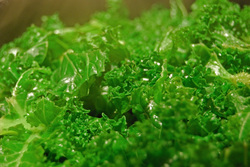 The hype and attention surrounding the super food Kale has been persistent. But what exactly is Kale? It looks like lettuce but is far more nutritious than it. It is a leafy green vegetable belonging to the brassica family, which also includes cabbage, broccoli, collard greens and brussels sprouts. It comes in various varieties and commonly is seen with green or purple leaves. The versatility of Kale allows it to be consumed raw, cooked, baked, juiced or in a smoothie. Why is Kale a super food? Just one cup of chopped kale has only 33 calories, 5 grams of fiber and 0 grams of fat making it high in fiber, zero fat and a low calorie food and it contains no cholesterol. Fiber is important for proper digestion, it helps with detoxification of the body and liver and it binds bile, which in turn lowers blood cholesterol levels thus reducing the risk of heart disease. Kale is also packed full of various vitamins, minerals, copper, potassium, iron, manganese and phosphorus. Kale is high in iron. 100g of beef has 1.6 mg of iron while 100g of raw kale has 1.5 mg. Iron is important as it transports oxygen in our bodies, builds blood and is needed for many proteins in the body. Kale is also high in calcium, which keeps bones and teeth healthy, stabilizes blood pressure, plays a role in clotting and contributes to normal brain function. A 100g serving of 2% milk has 120 mg of Calcium while 100g serving of kale contains 150mg; meaning gram for gram, kale has more calcium than milk. Omega 3 fatty acids are also found in kale which are anti inflammatory in nature and important to decrease the inflammation found in arthritis, asthma and allergies. Kale is loaded with antioxidants in the form of Vitamin A, C, E, K, carotenoids and flavonoids. Vitamin A is important for vision, skin and supporting the immune system. One cup of kale has 134% of the daily recommended vitamin A. Vitamin C is important for the immune system, a natural antihistamine and important in collagen formation. That same cup of kale has 134% of your daily recommended vitamin C while a medium orange has 116% of the daily vitamin C. Vitamin E plays a role in red blood cell formation, supports the immune system and prevents the formation of blood clots. Kale has 684% of the daily-recommended amount of Vitamin K, which is important for normal blood clotting and bone formation. Kale also contains lutein and zeaxanthin, which are important for promoting eye health. Kale is delicious as a pizza topping, in a salad with balsamic vinegar and carrots, tossed with pasta with olive oils or as kale chips. Here's a recipe for Kale, Beet, Carrot and Avocado Salad Salad Ingredients: • 1 bunch kale, stemmed and finely chopped • 2 carrots grated • 3 beets grated • 1 avocado, peeled, pitted and cut into halves • 1/2 of pomegranate's seeds In a large bowl add the chopped kale. Using your hands massage the avocado into the kale as thoroughly as possible. Once the kale is coated, add the grated carrots, beets and pomegranate seeds. Toss as evenly as possible. Dressing • 2 tablespoons lemon or lime juice freshly squeezed • 3 tbsp. olive oil • 2 tbsp. balsamic vinegar • Pinch of salt • Ground pepper to taste Combine above in small bowl. Toss salad. Serve chilled. Please note if you are on warfarin/ Coumadin avoid large amounts of kale due to it's high vitamin K content. As well, raw kale is goitrogenic so consume with caution if at risk.
2 Comments
|
Harmi KalerDoctor of Naturopathic Medicine in Okotoks and Calgary. Categories
All
Archives
July 2015
|
CLINIC INFORMATION
|
LOCATION
113 - 109 Southbank Blvd
Okotoks AB T1S 0G1 Phone: 403 938 1138 Fax: 403 982 2114 Email: [email protected] |
HOURS
Monday: 10am - 6 pm Tuesday: 10 am - 6 pm Wednesday: 10am - 6 pm Thursday: 10am - 6 pm Friday: 10am - 6 pm Saturday: by appointment only Sunday: Closed Holidays: Closed UPCOMING CLINIC CLOSURES
|
This website is for educational purposes only. The content on this website is not meant to treat, diagnose or prevent any conditions. Always consult with a qualified healthcare provider for your care. The author of this website is not liable for any adverse effects that may occur based on any information obtained from this website.
Copyright ©2013-2023 by Harmony Health Integrative Centre. All Rights Reserved
Copyright ©2013-2023 by Harmony Health Integrative Centre. All Rights Reserved

 RSS Feed
RSS Feed